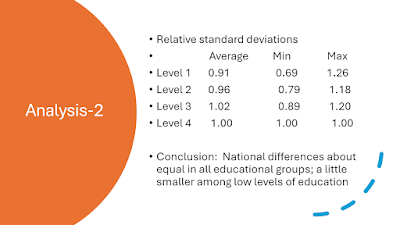In 1965, there was a Harris poll of college students. One of the questions involved showing people a list of authors and asking if any were among your favorites. The authors, listed in order of number choosing them, were William Faulkner, JD Salinger, Ian Fleming, James Baldwin, Albert Camus, Jean-Paul Sartre, Edward Albee, Henry Miller, John Updike, CP Snow, Saul Bellow, Norman Mailer, Philip Roth, Jean Genet, William Burroughs, John Cheever, and Doris Lessing. Baldwin was known for his writings on race and the civil rights movement, and Fleming was a genre novelist (James Bond)--the others could be called "literary" authors.* I made an index of the number of literary authors that students named as favorites (capped at 4)--about 30% scored 0, 30% 1, 24% 2, 8% 3, and 8% 4 or more. The survey was mostly about college affairs, but there were a number of political questions, and I looked at their association with score on the literary authors index and with picking Fleming as a favorite. Baldwin took clear positions on some of the issues, so picking him was an obvious signal of political views--I was interested in whether general taste in literature was associated with political views.
The results:
Vote (or preference) in 1964 election:
literary authors: more likely to support Johnson
Fleming: no clear difference
Party ID:
literary authors: more likely to be Democrats or Independents
Fleming: no clear difference
Have your views on politics changed a good deal, some, or only a little in college?
literary authors: more likely to say a good deal or some
Fleming: no clear difference
Vietnam (carry war to North Vietnam; negotiate and get out; hold the line)
literary authors: more dovish
Fleming: more hawkish
Should "girl students" be able to obtain contraceptives at the school infirmary?
literary authors: more likely to say yes
Fleming: no clear difference
Should laws on abortion be relaxed, tightened, or kept the same?
literary authors: more likely to say relaxed
Fleming: maybe some preference for tightened or kept the same
Approve of Mississippi Freedom Summer
literary authors: more likely to approve
Fleming: less likely
Approve of Negro and white students living in the same dormitories:
literary authors: no clear difference
Fleming: no clear difference
Approve of Negro and white students eating in the same cafeterias:
literary authors: no clear difference
Fleming: no clear difference
For the preceding two questions, overwhelming majorities approved.
Approve of Negro and white students belonging to the same social clubs
literary authors: no clear difference
Fleming: less likely to approve
Overall, there was strong approval, but 21% of students who chose Fleming as a favorite author disapproved, compared to only 9% of those who didn't choose him.
Approve of Negro and white students dating each other:
literary authors: more likely to approve
Fleming: less likely to approve
Approve of "intermarriage between the races"
literary authors: more likely to approve
Fleming: less likely to approve
There was a pretty consistent tendency for people who liked more literary authors to take liberal positions. With Fleming, it was less consistent, but when it made a difference, choosing him as a favorite was associated with more conservative positions. Why? There's a saying (usually attributed to Robert F. Kennedy, Sr., but apparently George Bernard Shaw said it first): "some men see things as they are and ask why; I dream of things that never were and ask why not?" This leaves out a third group (and probably the largest one): those who see things as they are and say "that's just the way it is." That is, people who are curious about things are more likely to be critical; conversely, people who just want to be more entertained are more likely to favor keeping things as they are.**
The more general point is that the association between intellectualism and left-of-center political views is deeply rooted.
*Sartre also wrote on politics, but I think that at that point he was better known for his novels and plays.
**See also this post.









